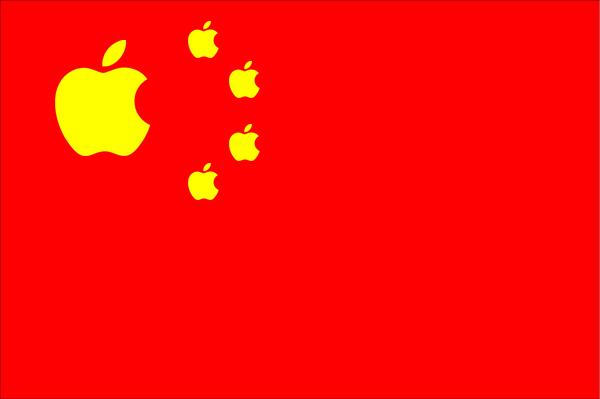Within a sometimes hostile environment for foreign media in China, The New York Times has been singled out for special treatment from authorities, particularly after hard-hitting reporting on the wealth of the family of then Prime Minister Wen Jiabao in 2012. Most recently, Apple has agreed to remove both the English and Chinese versions of the New York Times app from its China-based App Store following a request from government officials. Neither Apple nor the government has yet publicly stated the reasons for the removal, but new regulations introduced last summer placed further restrictions on apps in an effort to curb the spread of “illegal information.” The Times’ app removal may be linked to recent reporting by David Barboza–who also reported the 2012 Wen Jiabao story–about iPhone production in China and other China coverage in the paper. From Katie Benner and Sui-Lee Wee at The New York Times:
In the weeks leading up to the withdrawal of the Times apps, The Times was working on various articles related to the Chinese government. One of them, posted online on Dec. 29, revealed the billions of dollars in hidden perks and subsidies that the Chinese government provides to the world’s biggest iPhone factory. China is also one of Apple’s largest iPhone markets, though sales in that region have slowed.
On Dec. 23, David Barboza, a Times reporter, spoke with members of Apple’s media team about the article. Mr. Barboza had previously been in touch with the iPhone factory owner, Foxconn. He had also contacted the Chinese government as part of his reporting.
Later that day, a separate team from Apple informed The Times that the apps would be removed, Ms. Murphy said. [Source]
From Barboza’s December 29 report about FoxConn:
The well-choreographed customs routine is part of a hidden bounty of perks, tax breaks and subsidies in China that supports the world’s biggest iPhone factory, according to confidential government records reviewed by The New York Times, as well as more than 100 interviews with factory workers, logistics handlers, truck drivers, tax specialists and current and former Apple executives. The package of sweeteners and incentives, worth billions of dollars, is central to the production of the iPhone, Apple’s best-selling and most profitable product.
It all centers on Zhengzhou, a city of six million people in an impoverished region of China. Running at full tilt, the factory here, owned and operated by Apple’s manufacturing partner Foxconn, can produce 500,000 iPhones a day. Locals now refer to Zhengzhou as “iPhone City.”
The local government has proved instrumental, doling out more than $1.5 billion to Foxconn to build large sections of the factory and nearby employee housing. It paved roads and built power plants.
It helps cover continuing energy and transportation costs for the operation. It recruits workers for the assembly line. It pays bonuses to the factory for meeting export targets.
All of it in support of iPhone production. [Source]
Many have criticized Apple for acceding to government demands without offering a public explanation or showing evidence of a court order or other official document justifying the order. Times reporter Katie Benner gave further details about her reporting on the app’s removal:
https://twitter.com/ktbenner/status/816746817257881601
https://twitter.com/ktbenner/status/816746962724777985
https://twitter.com/ktbenner/status/816747245026549761
https://twitter.com/ktbenner/status/816747877267607552
https://twitter.com/ktbenner/status/816748365547532288
https://twitter.com/ktbenner/status/816748472196038656
The New York Times website has been blocked China since 2012, and the app was barred from updating new content in China, but the company was later able to install technology and use other techniques to evade government censorship. GreatFire, which helped The Times produce an Android app that provides uncensored content, condemned Apple for the recent move in a series of tweets:
Need to clarify some things on Apple and the NYT in China. Following comments are those of https://t.co/y2kp3aXdip.https://t.co/3AxhlUiqGY
— GreatFire.org (@GreatFireChina) January 5, 2017
We developed @NYTimesChina uncensored Chinese-language Android app which continues to work unobstructed in China. https://t.co/ShDyIjOgLw
— GreatFire.org (@GreatFireChina) January 5, 2017
App works because collateral freedom. Requests app sends for news are hidden inside encrypted connections. Authorities can't counterattack.
— GreatFire.org (@GreatFireChina) January 5, 2017
We don’t do iOS since Apple removed our @FreeWeibo app from store. We can evade Chinese authorities but not censorship by Apple leadership.
— GreatFire.org (@GreatFireChina) January 5, 2017
We're defeating China's well-developed censorship apparatus, only to be thwarted by actions of a publicly listed American company. $AAPL
— GreatFire.org (@GreatFireChina) January 5, 2017
And from New York Times reporter Chris Buckley:
Apple severs a bridge to our most avid and critical readers for China news — our Chinese readers. Doesn't Apple owe them an explanation? https://t.co/Hg8yiXOgiN
— Chris Buckley 儲百亮 (@ChuBailiang) January 5, 2017
This move comes as the Chinese government has announced plans to expand its overseas media outreach via a newly revamped CCTV called the China Global Television Network. Since taking office, Xi Jinping has renewed the focus on state media as a propaganda organ by both pressuring domestic media to “speak for the Party” and attempting to influence foreign media coverage of China.








